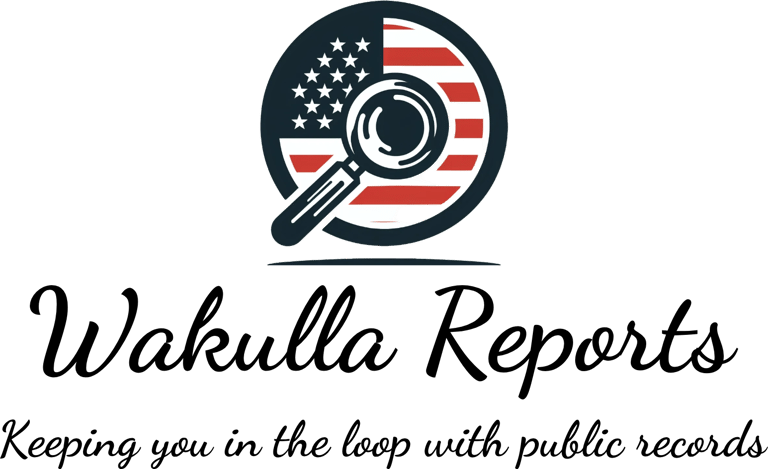Another Conspiracy: Wakulla County Attorney and Lawyers Accused of Witness Intimidation
Wakulla County Conspiracy: County Attorney and Lawyers Accused of Witness Intimidation via Search Warrant in Plaintiff's Fight for Justice
ELECTED AND NON ELECTED OFFICIALS
Aggie Christie
3/17/20255 min read


Plaintiff’s Fight for Justice Ends in Dismissal: A Tale of Retaliation and Legal Loopholes
Plaintiff, a former employee of Wakulla County, Florida, has spent years battling what she described as a malicious conspiracy by attorneys Ariel Cook, Heather Encinosa, Margaret Zabijaka, and their respective law firms, Constangy, Brooks, Smith & Prophete, LLP, and Nabors, Giblin & Nickerson, P.A. Her allegations, rooted in a prior sexual harassment lawsuit against the county, painted a chilling picture of retaliation through a criminal complaint designed to silence her. Yet, despite her impassioned claims under the Civil Rights Act of 1871 (42 U.S.C. §§ 1985(2) and 1986), both the district court and the Eleventh Circuit Court of Appeals have dismissed her case, leaving the few who know about this feeling she got screwed by a system that shielded her adversaries.
The Backstory: A Workplace Nightmare
Plaintiff’s ordeal began in 2004 when she joined Wakulla County’s Building Department. Over the years, she alleges she faced sexual harassment, gender discrimination, and retaliation from a supervisor who blocked her promotion due to a hip injury and subjected her to inappropriate comments and harassment. After enduring suspension, a demotion, and a transfer, Plaintiff fought back, filing a federal lawsuit against the county in 2018 (Case No. 4:18-cv-00586-MW-CAS) under Title VII of the Civil Rights Act of 1964 and the Florida Civil Rights Act. Representing the county were Cook and Zabijaka of Constangy, Brooks, Smith & Prophete, LLP, with Encinosa, the county attorney from Nabors, Giblin & Nickerson, P.A., consulting on the case. That lawsuit settled on October 5, 2019, but not before a series of events that would spark Plaintiff’s second legal battle.
During her tenure, Plaintiff recorded workplace conversations for her protection, a practice she says was openly acknowledged. A SONITROL sign at the county administration building warned of possible audio and video recording, and her supervisor reportedly boasted that employees could record anyone without consent. When the county requested these recordings during discovery, Plaintiff complied fully, even supplementing them when she found additional files.
The Alleged Conspiracy: From Discovery to Criminal Complaint
The turning point came in June 2019, when Zabijaka questioned the legality of Plaintiff’s recordings under Florida’s two-party consent law (§ 934.03, Florida Statutes), threatening to strike them from the case. Plaintiff’s attorney, Richard E. Johnson, dismissed the accusation as baseless, citing scant judicial precedent for applying the statute in workplace settings. But in early July 2019—months after Plaintiff’s employment ended on April 16—Cook, Encinosa, and Zabijaka allegedly took a drastic step: they reported her to Wakulla County law enforcement, seeking her arrest and prosecution.
On July 8, 2019, Detective Brett Surace secured a search warrant, and two days later, he and Lt. Eddie Wester searched Plaintiff’s home, leaving her “terrified and disconsolate.” Plaintiff’s complaint alleges this was no mere legal maneuver but a calculated act of intimidation to deter her from testifying about the recordings in her federal case. She claims the defendants singled her out, ignoring similar recording practices by colleagues and acted outside their roles as attorneys, lacking any litigation privilege.
The criminal investigation, however, collapsed. Assistant State Attorney Brian Miller concluded on July 31, 2019, that Plaintiff hadn’t violated Florida law, closing the case without charges. Still, Plaintiff contends the ordeal pressured her into settling her sexual harassment lawsuit, prompting her to file a new federal suit (Case No. 4:19-cv-00335-MW-CAS) on December 2, 2019. She accused the attorneys of conspiring under § 1985(2) to obstruct justice and their firms of failing to stop them under § 1986, seeking damages for emotional harm, fear, and humiliation.
The Courts’ Rulings: A Crushing Defeat
The district court dismissed Plaintiff’s amended complaint with prejudice, ruling she hadn’t shown the attorneys acted outside their representation of Wakulla County. Plaintiff appealed to the Eleventh Circuit (USCA11 Case: 20-11699), but on September 28, 2022, a divided panel affirmed the dismissal. Writing for the majority, Judge Tjoflat held that under Farese v. Scherer (2003), attorneys are immune from § 1985(2) claims if acting within the scope of representation. Tjoflat reasoned that reporting Plaintiff’s recordings to law enforcement, even if aggressive, fell within the attorneys’ duty to protect their client’s interests, especially since Plaintiff offered no plausible facts suggesting personal motives over client benefit.
Judge Brasher concurred in the judgment but disagreed on the scope issue, arguing it’s reasonable to infer at the dismissal stage that employment lawyers don’t typically file police reports for clients. He upheld the dismissal on narrower grounds: Plaintiff hadn’t plausibly alleged “force, intimidation, or threat” under § 1985(2). Brasher noted that reporting a potential crime with a reasonable basis—like Florida’s two-party consent law—doesn’t meet the statute’s threshold, rooted in the Ku Klux Klan Act’s aim to combat violent obstruction, not lawful police notifications.
A System Stacked Against Her?
Plaintiff painted a vivid picture of retaliation: attorneys weaponizing a baseless criminal complaint to silence her, only to be shielded by legal technicalities. The Eleventh Circuit’s reliance on Farese—a precedent protecting attorney advocacy—left her claims dead on arrival, unable to pierce the “scope of representation” shield. Brasher’s concurrence hints at unease with this blanket immunity, yet his focus on the lack of overt intimidation sidestepped the chilling effect of a home search on a whistleblower.
Critics might argue Plaintiff got screwed—not by a lack of merit, but by a judicial framework that prioritizes adversarial zeal over accountability. The courts didn’t dispute her trauma or the search’s impact, yet found no remedy under § 1985(2). Her recordings, deemed lawful by the state, became the spark for a retaliation she couldn’t legally avenge. The dismissal of her § 1986 claims against the firms, unappealed and derivative of the § 1985(2) failure, further cemented her defeat.
What’s Next?
Plaintiff’s legal journey appears over. Her case underscores the tension between attorney immunity and protections for litigants alleging misconduct. For now, she’s left with a settlement from her first case, a dismissed second suit, and a lingering sense—shared by some—that the system failed to deliver justice for a woman who dared to document her workplace truth.
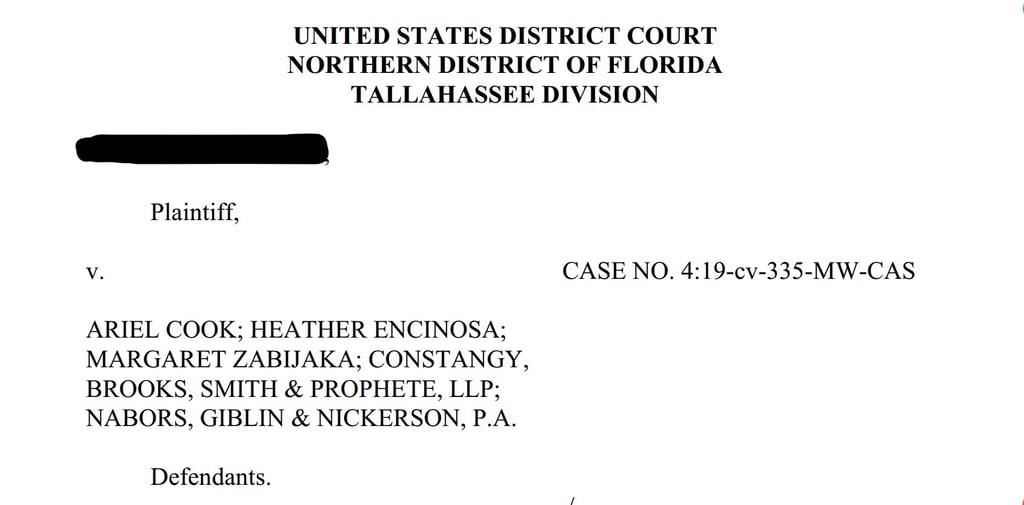

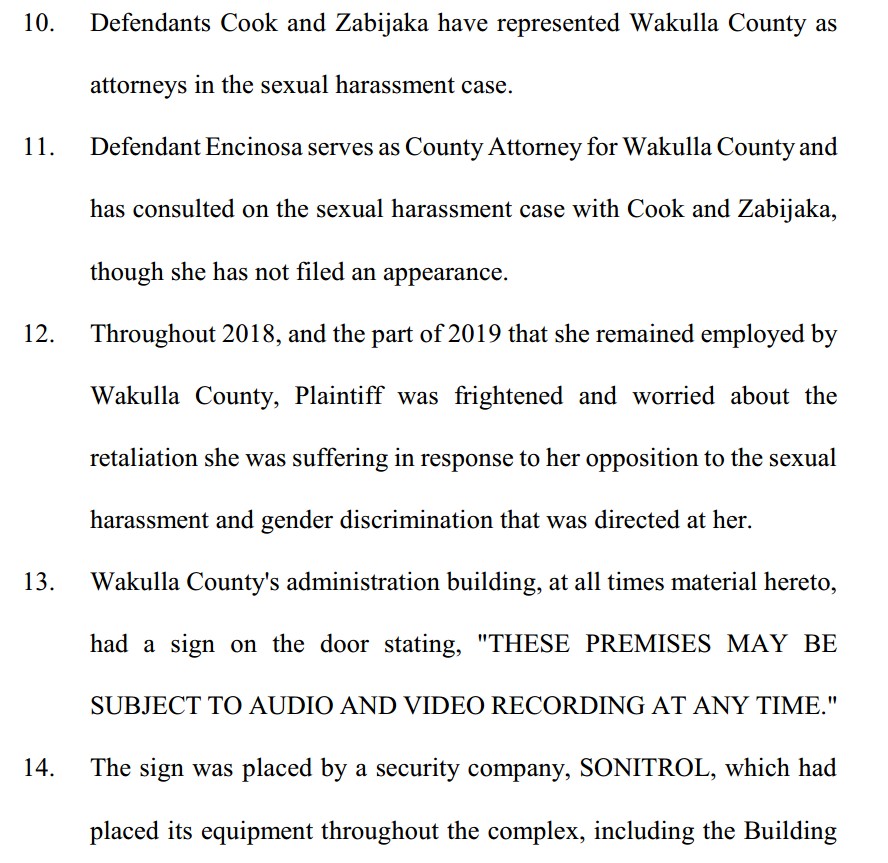

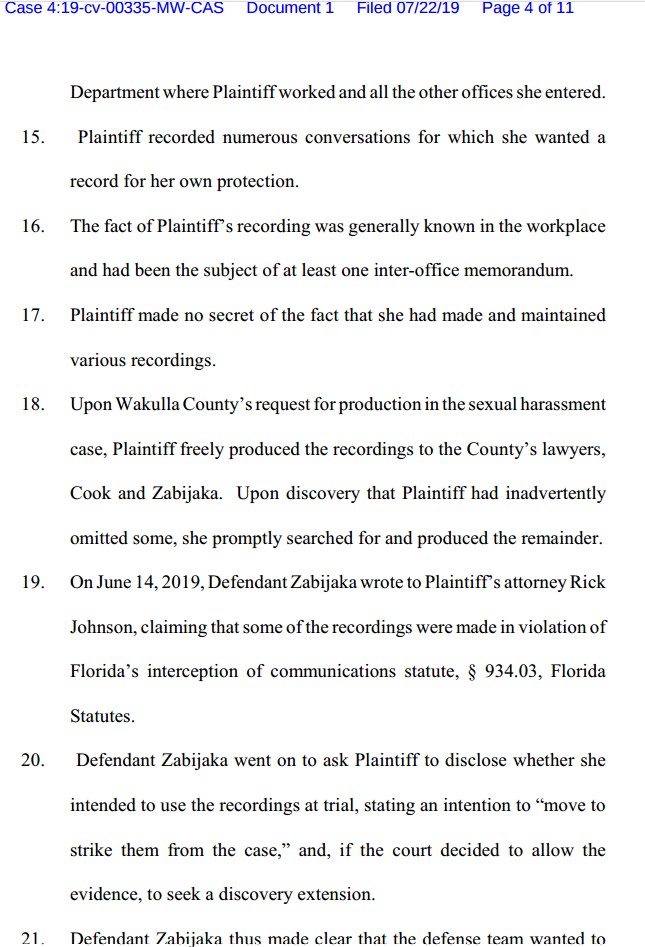

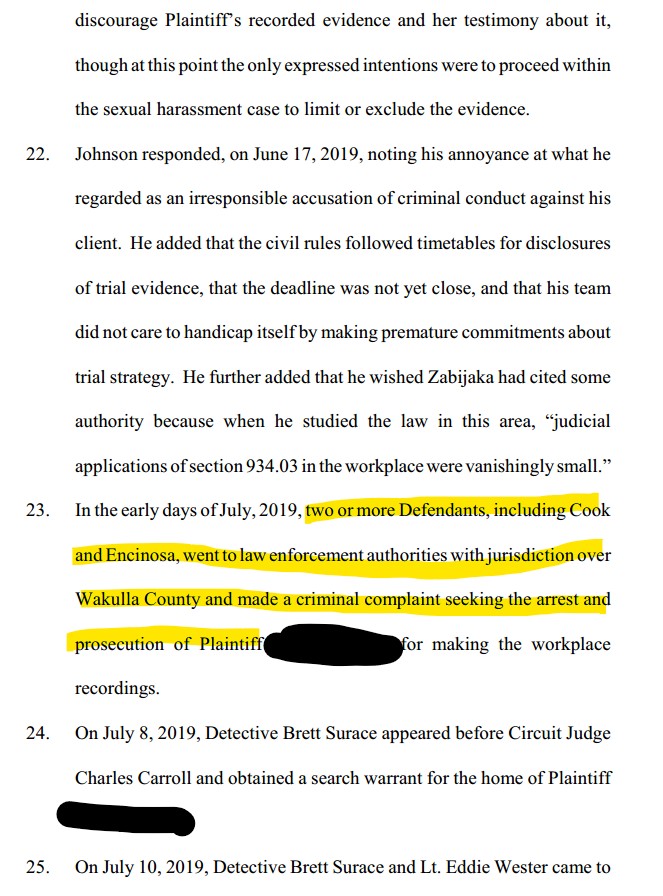

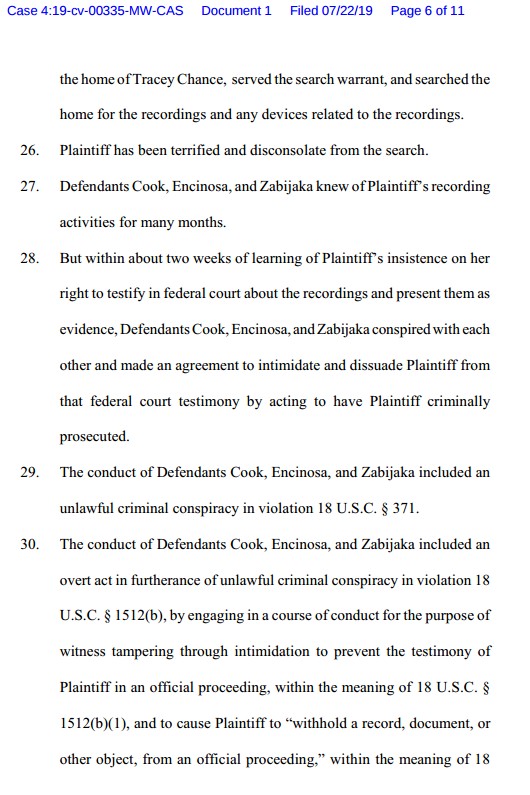

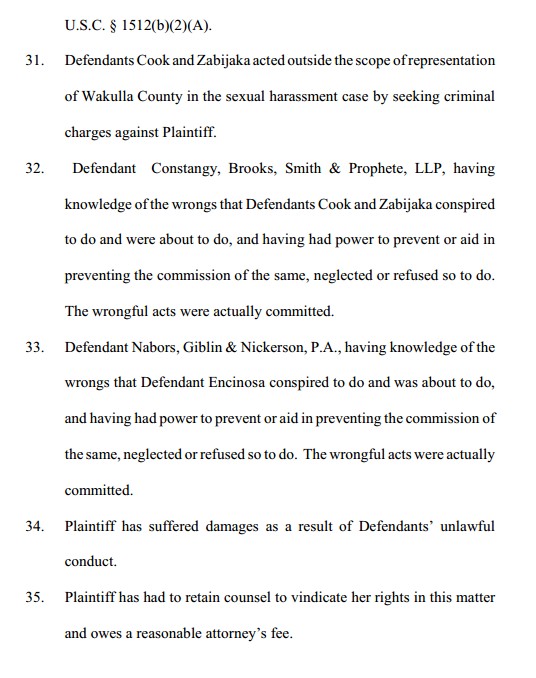


Additional Social Links
YouTube is your go-to for short clips, video explainers, and visual breakdowns of how Florida and Wakulla governments really work.
Facebook brings you bite-sized written content, sticky-note facts, and rolling updates you can share and discuss.
NEW! TikTok You can now follow Wakulla Reports on TikTok for quick updates and BOCC video clips.
Prefer to browse at your own pace?
Bookmark our website and visit anytime for fresh posts, resources, and real-life examples from right here in Wakulla County.
© 2024. All rights reserved.
